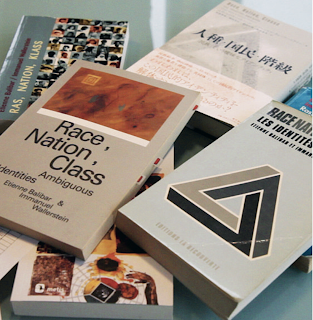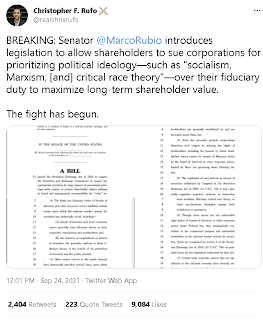There was a moment in the beginning of the COVID pandemic when I thought to myself that surely this would be the end of the anti-vaccination movement. It is one thing to be against vaccines when diseases are rare, and pandemics a distant memory, but another to be against them in the midst of a pandemic in which tens of thousands were dying each week in the US alone. The anti-vax position always seemed like a luxury position, a position of privilege, an individual refusing vaccines is taking advantage of the fact that others are vaccinated around them and cases are rare. Like many things in US politics and culture, individual autonomy is made possible by the existence and occlusion of collective action. It is for that reason that I thought such a position would collapse in the face of an actual pandemic.
Friday, September 05, 2025
Friday, July 18, 2025
Being Illegal: Ideology and the Law
For the past fifteen years I have been teaching a class on work. This class has undergone many changes throughout the years. Readings have circulated in and out. I always try to add something new, whether this be Elizabeth Anderson, Sarah Jaffe, or Jason Smith and Aaron Benanav. Somethings remain a constant, like John Locke, Adam Smith, Marx, and Kathi Weeks. The things that change the most are the movies that I pair with the class. I have taught Office Space, Clockwatchers, Sleep Dealer, Sorry to Bother You, and The Assistant to name a few.
Monday, July 07, 2025
Interpretation or Innovation: On Macherey's La Chose Philosophique
Wednesday, April 02, 2025
Workers of the World, Divide! Work and the Constitution of the People
Sunday, February 16, 2025
Post-Orwellian: From 1984 to Project 2025
Etienne Balibar titled one of his first essays on Spinoza to appear in English, "Spinoza, The Anti-Orwell." George Orwell is not really discussed in the essay, and the title is only referenced once in the final paragraphs. Balibar writes,
Sunday, October 20, 2024
Why We Write: Or, Blogging as a Philosophical Practice
Wednesday, April 24, 2024
One, Two, Many Spinozist-Marxisms: A Postscript to The Double Shift
I have commented before, more than once even, that the intersection of Spinoza and Marx is less a position, something like Spinozist Marxism, than a field of intersecting problems and questions. In some sense it is possible to even map out the way in which different Marxists draw from different elements of Marx (and Spinoza) creating different articulations of the relations which intersect with different problems in the critique of capitalism.
Friday, December 15, 2023
Commonalities: on Pascucci's Potentia of Poverty
There are many different answers to the question of what Marx and Spinoza have in common, theories of ideology, materialism, naturalism, and so on, to name a few that have been discussed on this blog. To this list Margherita Pascucci adds that perhaps what Spinoza and Marx have in common is the common itself. This is is claim put forward in Potentia of Poverty: Marx Reads Spinoza (part of the Historical Materialism series, currently it is only out as a hardcover, but it will be out from Haymarket in the Spring).
Tuesday, May 09, 2023
One Amendment to Rule them All: Symptomatically Reading the Bill of Rights
If one wanted to find a text to confirm Louis Althusser's thesis that the writings of the young Marx were not yet Marx, and thus best left to the dustbin, one could perhaps find not better contender than "On the Jewish Question." Much of the essay is a response to Bauer, and part of a long forgotten debate. When Marx breaks free of this debate in the final paragraphs it is to engage in horrible stereotypes of Jewish materialism and greed that many have considered to be not only anti-semitic, but symptoms of self loathing. I am not entering into these debates here, but will say that I have regretted every time I taught the text. If there is one argument for considering to read the essay, as well as to teach it, however, it has to do with the reading and analysis that Marx puts forward of the Declaration of the Rights of Man and Citizen.
Sunday, March 19, 2023
The Order and Connection of Racism: Balibar on Racist Knowledge and Belonging
Sunday, January 08, 2023
The Imaginary Institution of Society: Spinoza's Version
Friday, October 14, 2022
The Dialectics of Obedience: Vardoulakis, Balibar, Macherey
Thursday, April 21, 2022
If Althusser was a Spinozist...: on Juan Domingo Sánchez Estop's Althusser et Spinoza
One of Althusser's fundamental lessons, and one that remains beyond the controversies about epistemic breaks, the young Marx, and the real Marx, is that Marx's philosophy and politics must be located not at this or that isolated quote or passage, but as traversing the entirety of his work. The condition of immanent causality is a reading of philosophy itself as the immanent unfolding of ideas that are all the more important because they are pervasive, located not in this or that passage, but in the entirety of the work. To some extent Juan Domingo Sánchez Estop's Althusser et Spinoza: Détours et Retours does a similar work on Althusser, searching for Althusser's Spinozism not just in the few well known passages in the ISA essay, Lire Le Capital, and Elements of Self-Criticism where Spinoza is cited by name, but also in the way that Spinoza's thought or practice of philosophy traverses Althusser's work.
Friday, November 12, 2021
Other Scenes: Balibar and Tosel on Class Struggle and the Struggle over Identity
Wednesday, October 13, 2021
The Dialectic of Conspiracy and Trust: Hegel and Conspiracy Theories
This post is an immediate follow up or even sequel to an earlier post on Spinoza and conspiracy theories. In a more oblique way it is also a follow up to something that I have said repeatedly on this blog, that not only is there more to Hegel's Phenomenology of Spirit than the master and slave, but that other dialectical scenes or figures can also be wrested from the linear progression of Hegel's thought to become the basis of social and political criticism. Kojeve can't have all of the fun.
Saturday, April 24, 2021
Woke Capital and Twilight of the Bourgeoisie (How is that for a title?).
Thursday, March 04, 2021
Everyone is Disposable: On Ogilvie's L' Homme Jetable
Sunday, December 20, 2020
...as if it was Salvation: Dialectics of Obedience in Spinoza
Dimitris Vardoulakis' Spinoza, the Epicurean: Authority and Utility in Materialism puts forward the bold thesis that there is a dialectic of authority and utility in Spinoza. That obedience is situated between authority, between the "Potestas" of kings and God, and utility, the potentia of intellect and bodies. It is from this perspective that Vardoulakis presents a reading of Spinoza's Tractatus Theologico-Politicus. Despite the title of the book, which suggests a more modest exegetical undertaking, the stakes of this are less a matter of simply tracing the epicurean dimensions of Spinoza's thought (although it does that) than using those threads to expand the stakes of Spinoza's political thought. Vardoulakis' book takes on not only other readers of Spinoza, Negri, Deleuze, Althusser, Balibar, and Sharp, but also the central question of Spinoza's thought, why do people fight for their servitude as if it was salvation?
.jpg)


















